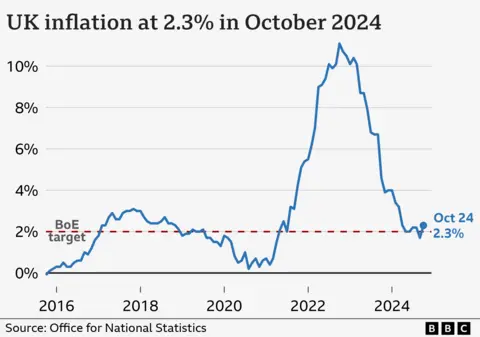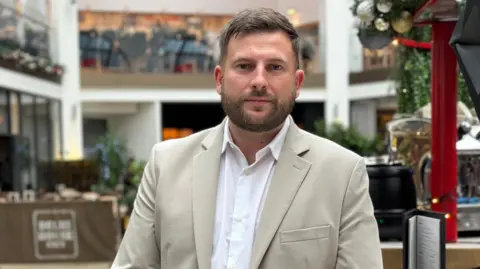 .
.A rise in energy prices pushed UK inflation to its highest rate for six months, official figures show.
The inflation rate, which measures price changes over time, hit 2.3% in the year to October, a bigger-than-expected increase from 1.7% in September.
Annual gas and electricity bills for a typical household went up by about £149 last month, but prices are rising much more slowly than in recent years.
However, the rate, which is closely monitored to determine interest rates, is now back above the Bank of England’s 2% target.
Interest rates were cut for the second time this year to 4.75% two weeks ago, but economists and analysts are not expecting further cuts until 2025.
Higher inflation pushes up the cost of living for households, and can lead to interest rates remaining at a higher level, making the cost of loans, credit cards and mortgages, more expensive and impact people’s spending power.
Inflation has fallen from its peak in October 2022, but when the rate falls, it does not mean that prices are coming down, but that they are rising less quickly.

Grant Fitzner, chief economist for the Office for National Statistics (ONS), said while higher energy costs had contributed, this increase was offset by falls in live music and theatre ticket prices.
“The cost of raw materials for businesses continued to fall, once again driven by lower crude oil prices,” he added.
Annual inflation was last at 2.3% in April. However, with temperatures dropping to freezing levels and snow hitting parts of the UK this week, rising energy bills will once again become the focus of many households.
People using an typical amount of gas and electricity are currently paying £1,717 under the energy price cap, which is set by the regulator Ofgem.
The cap determines the price paid for each unit of energy used in 27 million homes across Britain. Different rules apply in Northern Ireland.
Derek Likorish, chief executive of energy supplier Utilita, said he had seen a 60% increase in customers asking the company for help.
“Now it’s really cold, that figure is going to be even higher. People are running on empty,” he told the BBC.
“There’s so much anxiety around at the moment, and I have never been so concerned as I am, about this winter with no additional help from the government,” Mr Likorish added.
Although energy prices are still lower than last winter, the jump in electricity and gas costs comes as support handed out in recent years for bills has been scaled back.
The government has also announced that it will start means-testing winter fuel payments, halting them for 10 million pensioners in England and Wales.
Darren Jones, chief secretary to the Treasury, said the government knew “families across Britain are still struggling with the cost of living”.
“We know there is more to do,” he added.
As well as energy costs increasing last month, inflation in the services sector, which measures price rises for things such as haircuts, airfares and hotels, ticked up to 5%.
Food price inflation remained unchanged from September, but alcohol and tobacco prices rose sharply.
‘Constant battle’

James Stott, general manager of Garten Bar in Manchester’s Corn Exchange, said inflation was “yet another challenge in an industry that seems to constantly battle challenges”.
“We will strive to not let that affect our guest prices, but eventually it will have to be passed on,” he said.
He said his business had to deal with rising wages, as well as increasing costs for goods.
Russ Mould, investment director at AJ Bell, said policymakers could argue inflation at 2.3% is still “relatively low”, but he added householders “will really feel the impact of the last few years’ cumulative price increases”.
He said compared to October 2020, the goods monitored to calculate the UK’s inflation rate was up by 24%.
“If policymakers and politicians want to know why consumer confidence remains depressed and voters remain fractious, there is your answer,” he added.
Fiona Cincotta, a financial market analyst, told the BBC the “hotter” than expected inflation rate comes as the Bank of England has “already warned that rates may be cut at a slower pace owing to the uncertain outlook for consumer prices after Labour’s Budget”.
Responding to the latest figures, shadow chancellor Mel Stride said: “Having brought inflation back down to target, we know how important it is for all of us that the government does the same.”
He also questioned the impact of Chancellor Rachel Reeves’ first Budget on prices and the broader economy.
A big boost to spending on public services by the government is expected to raise inflation in the short term, which could prevent interest rates falling more quickly, while there are concerns tax rises for businesses could hit economic growth.
Andrew Bailey, the Bank’s governor, said earlier this month that interest rates were likely to “continue to fall gradually from here”, but cautioned they could not be cut “too quickly or by too much”.
